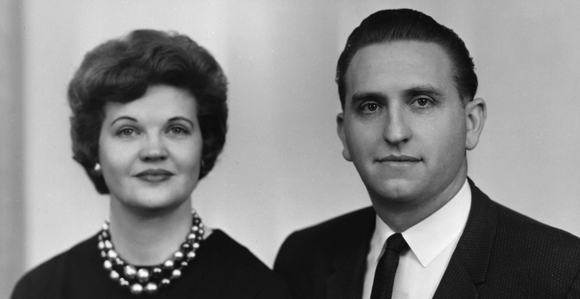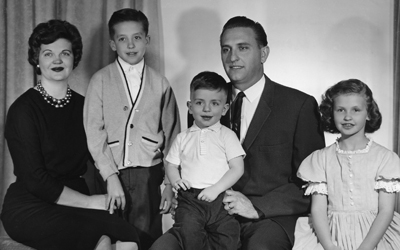Canadian Missionaries Remember Sister Frances J. Monson
Contributed By By Gerry Avant, Church News editor

Sister Frances J. Monson accompanied her husband, Thomas S. Monson, as he presided over the Canadian Mission from 1959 to 1962.
Article Highlights
- Sister Frances J. Monson served with her husband, Thomas S. Monson, in the Canadian Mission from 1959 to 1962.
- Members and missionaries remember Sister Monson as being both proficient and dedicated in her service in the Canadian Mission.
- She maintained the mission home, prepared and served meals, and took care of sick and injured missionaries, all while being a wife and mother.
“Sister Monson had a profound influence for good upon my life as a young missionary. … I witnessed the tender care of a remarkable young mother and her sweet and gentle love for … President Monson and … the many missionaries and members in the Canadian Mission.”
—Ronald L. Knighton, missionary in the Canadian Mission
Related Links
Sister Frances J. Monson was a 31-year-old mother of two children when her husband, Thomas S. Monson, was called to preside over the Canadian Mission from 1959 to 1962. They had just three weeks before they were to report to mission headquarters in Toronto, Ontario, Canada. They traveled by train with their two young children, Tommy and Ann; Sister Monson was expecting their third child, Clark, who was born several months later.
A Canadian member, Helen Warner, was a teenager when President and Sister Monson arrived in Toronto and spoke at a meeting in a local chapel. “They were young and Sister Monson was expecting their third child,” Sister Warner said. “Sister Monson bore her testimony and wept as she spoke. We related to her. She had left her home and was going to have her baby far away from her family. We all immediately loved her.”
Sister Monson was a proficient manager of the mission home, according to Jerry L. Ainsworth, who lived in and worked out of it the last few months of his mission as he served as a counselor to President Monson. “The home also served as the residence of the second counselor in the mission presidency, very ill missionaries, missionaries who just arrived to begin their missions (from 6 to 10 at a time), and those who had finished their missions and were ready to return home.
“Sister Monson was in charge of that home. She assumed responsibility for its maintenance, meals being prepared and served, taking care of sick or injured missionaries, as well as being a wife and mother. President Monson not only presided over the missionaries but also the districts and branches … as this was a district and not a stake. All of those responsibilities involved his wife, who performed complementary tasks with aplomb and grace.”
John W. Hardy said, “She would travel to the various areas of the Canadian Mission to train the district and branch Relief Society presidencies while at the same time being a ‘mother figure’ to the many missionaries. With three children, one of whom was a baby, this was not an easy task. I couldn’t help but notice how calmly she dealt with all these responsibilities.”
Ronald L. Knighton, who lived in the mission home for a while, said, “Sister Monson had a profound influence for good upon my life as a young missionary. … I witnessed the tender care of a remarkable young mother and her sweet and gentle love for [her] newborn son—while caring for her other children, President Monson, and providing love to the many missionaries and members in the Canadian Mission.”
Jim Turpin spoke of Sister Monson’s frugality. “I would frequently accompany her on grocery shopping trips for the mission home. She could fill two large grocery carts and rarely exceed $60 and we all ate very well.”

The Monsons returned home from Canada in 1962. Pictured from left are Sister Frances J. Monson, sons Tom and Clark, President Thomas S. Monson, and daughter Ann.
Vaughn L. Pulsipher served over seven months as a traveling elder. “We would stop at the mission home every two to three weeks to do our laundry, collect our mail, meet with President Monson, … and even play a game of Ping-Pong in the basement. Sister Monson always gave us special attention. … If we hadn’t eaten … she would make us tomato soup and grilled cheese sandwiches. She would then sit with us to discuss our travels, inquire about our families, and chide us to be sure and write regularly to our parents. … Sister Monson was completely genuine, unpretentious, and without guile.”
Mike Murdock remembers meeting with President Monson in his office. “When we had completed our regular meetings with our zone leaders, he would ask Sister Monson to come into his office and would then share with her the highlights of several items we had discussed and seek her input, which she humbly gave and he carefully listened to.”
Taylor G. Ward said he remembers arriving at the mission home, where Sister Monson made him feel “welcome and wanted. … She had a polite dignity about her. … Together, they helped you believe that with the Lord’s help, ‘you can find, you can teach, and you can baptize.’”
Sister Monson had an instrumental role in the conversion of several people. In one of his books, Be Your Best Self, President Monson wrote about a man who telephoned one day, saying his family was from Holland, where they had heard about the Church, wanted to know more, and asked for the missionaries to visit. Sister Monson excitedly told the missionaries on the staff about the “golden referral.” However, they procrastinated their visit with the Dutch family. Night after night, she asked if they had visited. Finally, she told them, “If you aren’t going to call on the Dutch family tonight, my husband and I are going to call on them.”
The missionaries worked the visit into their schedule and taught and eventually baptized Jacob de Jager and his family. He served in the First Quorum of the Seventy from 1976 to 1993.
Sister Monson made a lasting impression not only on the missionaries but also on the local members. Elsie Bancroft spoke of the first time she saw the new mission president’s wife: “Sister Monson was wearing a stunning red winter coat. I admired its beauty on this lovely lady. Her response was gentle and humble as she asked me, a 16-year-old young woman, if I thought it was too ostentatious for a missionary. I immediately replied that it was perfect for her and she looked beautiful in it. I had no idea what the rules were for sister missionary clothing, yet this soft-spoken, gentle lady thoughtfully asked for my opinion. Sister Monson made me feel important to her.” —Stephen Hadley, who served as a counselor in the Canadian Mission presidency, and his wife, Shirley Hadley, contributed to this article.
